Have you recently been in your bathroom and thought, “Why does my shower stink?” If so, this post is for you. The good news is that a smelly shower is usually an easy problem to identify and fix. In the following sections, we're going to cover the possible causes for the smell along with how to get rid of smelly drains in showers:
- Identifying the Source of the Smell
- What Causes Clogs in the Shower?
- How to Unclog a Shower Drain
- What Is a Shower P-Trap, and How Can It Cause Odors?
- How to Clean Shower P-Traps
- What Is Biofilm?
- How to Clean Biofilm in the Shower
- What Can Cause Leaky Pipes?
- How to Fix Leaking Pipes
- Contact Mr. Rooter of Greater Syracuse for New York Plumbing Services
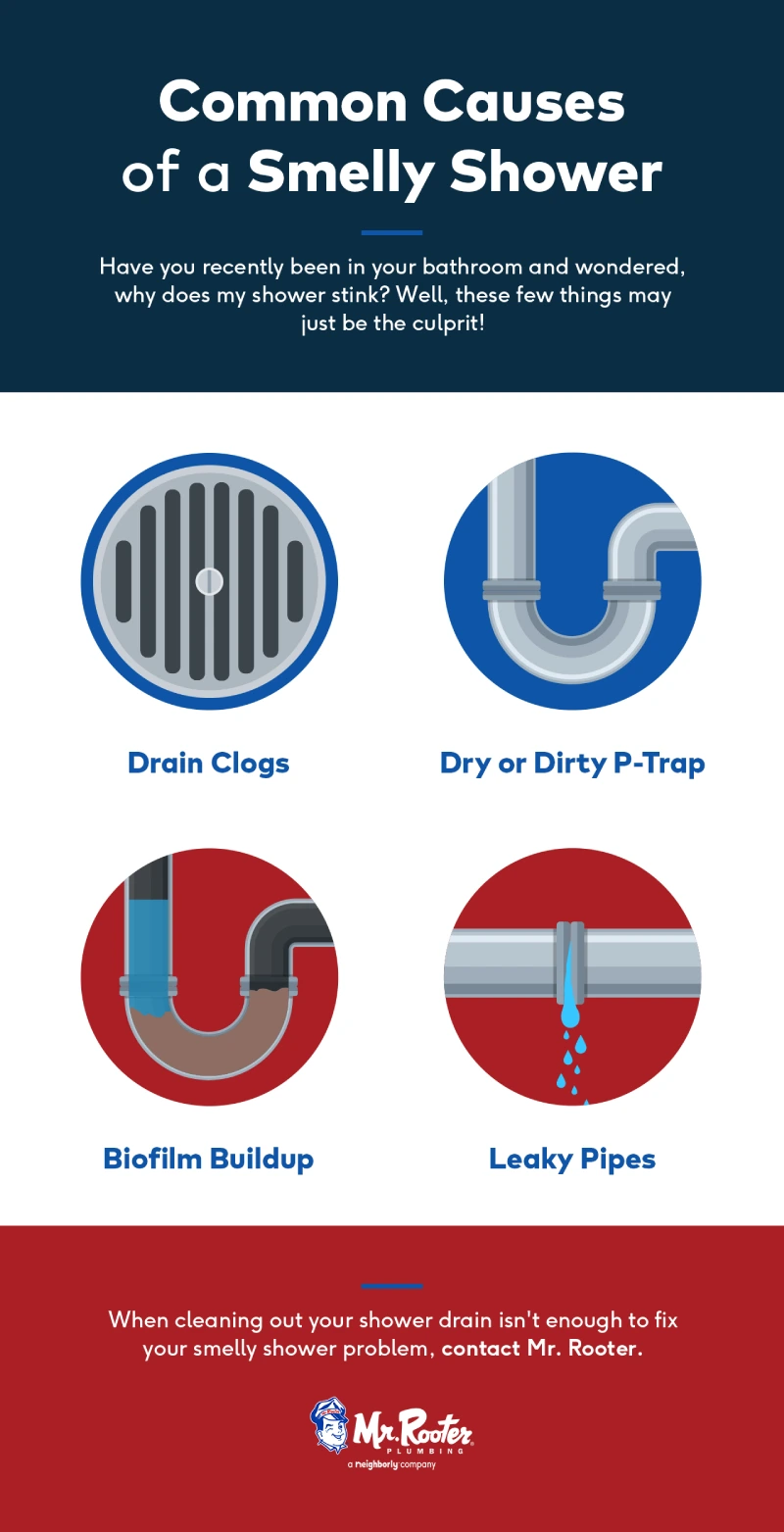
Identifying the Source of the Smell
When you notice new shower drain smells that make you wrinkle your nose in the bathroom, chances are you want to be rid of them ASAP. The first thing you should do is take note of how it smells. Unpleasant as it may be, this can help you determine the cause, as different smells indicate different problems. For example, a musty smell can indicate a dirty P-trap, while a sulfurous sewage smell indicates that sewer gases are making their way into your home.
We'll walk you through how to address some potential causes of bad smells so your bathroom can return to the refreshing, relaxing environment you want it to be rather than a den of unpleasant odors.
- Drain clogs
- Dry P-traps
- Biofilm buildup
- Leaky pipes
1. Drain Clogs
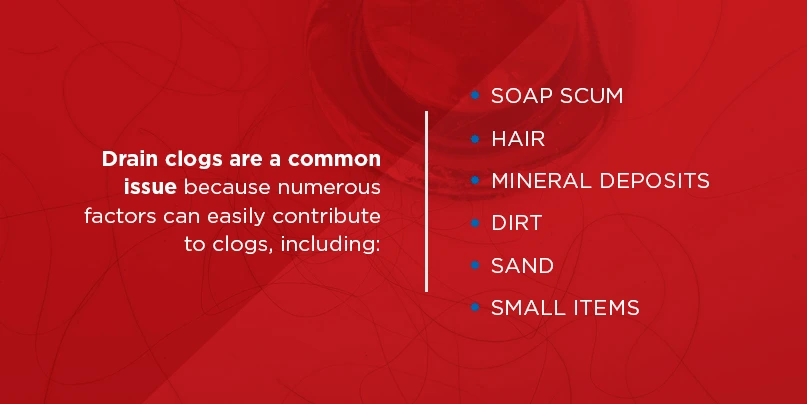
Shower clogs are a common issue, so it is always smart to consider this possibility when you notice an odor coming from your shower drain. If your shower is draining slowly or isn't draining at all, then this likely points to an obstruction in your drain. In showers, blockages can cause unpleasant odors since they trap grime and do not allow your water to drain properly.
What Causes Clogs in the Shower?
Shower drain clogs are a common issue because there are so many factors that cause them. Some usual suspects behind these obstructions include:
- Soap scum
- Hair
- Mineral deposits
- Dirt
- Sand
- Small items
Most clogs consist of a combination of these materials. For instance, soap scum can bind with a wad of hair to create a more solid obstruction. If you suspect you may have a blockage, it is a good idea to try to clear it and see if this fixes your odor problem.
How to Unclog a Shower Drain
There are several methods you can use to unclog a shower drain. One of the most popular is snaking the drain. It doesn’t involve harsh chemicals and is fairly inexpensive. While it is a bit more hands-on than other methods, it has one of the higher success rates, so it’s a great place to start.
You can purchase a drain snake, also known as a hand auger, at your local hardware store. This is one of the tools any DIY plumber should have on hand. Be sure to choose one with a 1/4 or 5/16-inch cable, so it is flexible enough to curve through your pipes.
If you’re in a pinch, you can make your own drain snaking tool by straightening out a wire coat hanger and leaving a hook on the end so it can get ahold of whatever material is blocking your drain. Whether you use a store-bought or a homemade snake, the method for clearing the obstruction is the same. Run the snake down the drain and pull it back up once you feel it hook onto the clog.
Be mindful that using a drain snake can cause damage to your pipes if done incorrectly. If you are uneasy, you can always call a plumber out to snake the drain. Some other options for clearing out a drain clog include:
- Pulling the clog out by hand if you can reach it
- Using a plunger to draw the clog up to the surface
- Pouring boiling water down the drain to help dislodge the obstruction
- Pouring a chemical cleaner down the drain to dissolve the clog
2. Dry or Dirty P-Trap
Another possible source of odors coming from your shower drain is a dry or dirty P-trap. If your shower drain smells like a sewer, then this is a sign that your P-trap may not be doing its job of blocking sewer gases from escaping into your bathroom.
If you're dealing with a mustier or general odor, then your P-trap could still be the problem, but in this case, it likely needs to be cleaned.
What Is a Shower P-Trap, and How Can It Cause Odors?
The P-trap is a U-shaped section of pipe that dips down below the rest of your shower drain line before it connects to your main stack. If you look under your bathroom or kitchen sink, you should be able to see P-traps here as well. Your shower's P-trap is likely concealed unless you can get to it from the basement.
The P-trap's function is to hold enough water at all times to keep gases from your sewer line from escaping through your shower and sink drains. If you begin to smell a sewage-like odor, then your P-trap may not be holding water as it should. In most cases, this is a minor, easy-to-solve issue. If you rarely use the shower, there is a chance the water in the P-trap has evaporated. You can fix a dry P-trap simply by running the water for a bit.
If you run the water frequently and still notice a sewage smell coming from your drain, then there may be a problem with your P-trap. An inspection by a plumbing professional can determine whether it needs to be refitted or replaced.
The problem could also be that your vent stack is broken or blocked, creating a vacuum that empties out your P-trap. If the odor doesn't smell like sewage, then you may just be dealing with a dirty P-trap. This is a common issue since the shape of a P-trap can cause grime to settle.
How to Clean Shower P-Traps
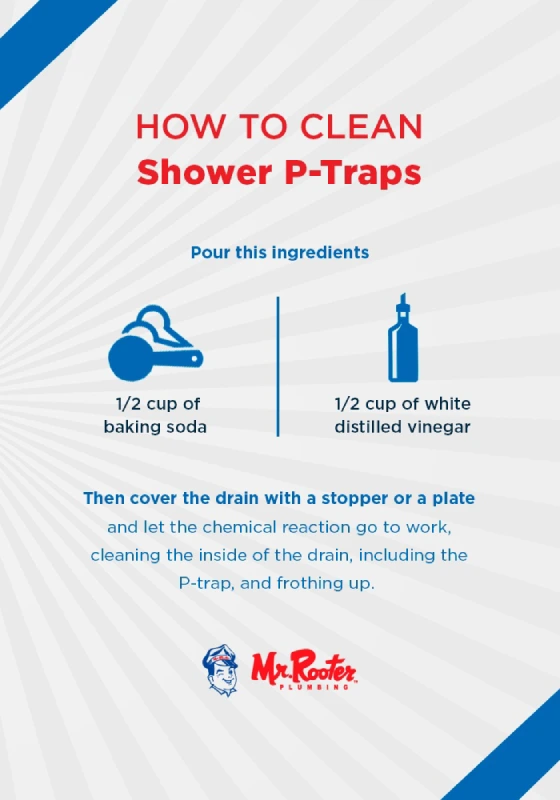
We've already mentioned the solutions to a dry P-trap or a malfunctioning one, but what if the source of the odor is a dirty P-trap? Even if you diligently clean your bathroom, you may not think about the parts of your bathroom you cannot see. Fortunately, cleaning your P-trap is a simple process and is an excellent way to deodorize a smelly shower drain.
Simply pour approximately 1/2 cup of baking soda down the drain, followed by about 1/2 cup of distilled white vinegar. Now cover the drain with a stopper or a plate and let the chemical reaction froth up and clean the inside of the drain, including the P-trap. This should clear out any grime or debris clinging to the inside of your P-trap and causing odors.
You can also use bleach or use other cleaners, but be wary of the fact that harsh chemicals can damage your pipes if you use them too frequently, so home remedies should come first.
3. Biofilm Buildup
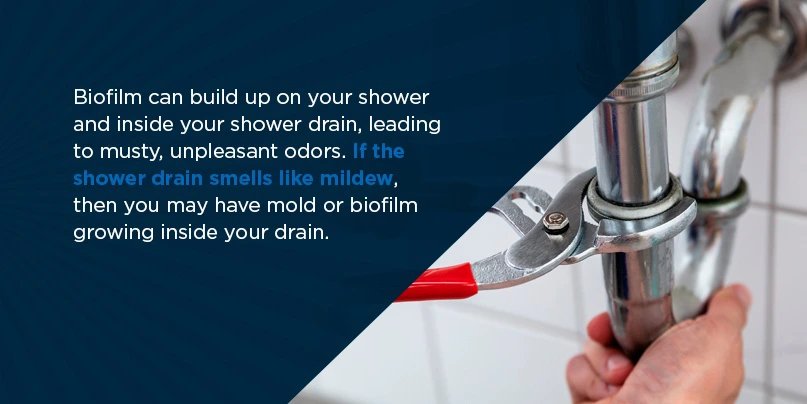
Another common culprit for shower odors is biofilm. Biofilm can build up in your shower and inside your shower drain, leading to musty, unpleasant odors.
If your shower drain smells like mildew, then you may have mold or biofilm growing inside your drain. Fortunately, fixing this issue is simple and inexpensive.
What Is Biofilm?
Most of us would likely describe biofilm simply as muck or slime. In some cases, it gets mistaken for mold. In reality, biofilm is a substance that forms from a dynamic colony of bacteria and bacterial waste. This bacteria is held together by a glue-like substance that feels slimy to the touch and clings to surfaces like river rocks, birdbaths, showers, and more. You even develop a layer of biofilm on your teeth, known as plaque, in between brushes.
Since there are countless types of bacteria, there are many different types of biofilm that can build up in your shower drain. One common type that often finds its way into showers has been nicknamed pink mold. However, there’s no need to be alarmed about mold damage. Pink mold is not really a mold — it is biofilm that contains the bacteria Serratia marcescens, shortened to S. marcescens. This biofilm has a pinkish or orangey tone.
In some cases, biofilm can be dangerous to your health. Certain types contribute to the spread of Salmonella, E.coli, MRSA, and more, which is why the odor biofilm produces isn't the only reason to remove it. S. marcescens, in particular, can infect open wounds and cause urinary tract and respiratory problems for people with compromised immune systems.
How to Clean Biofilm in the Shower
If you're wondering how to clean orange stains in the shower, then you are likely dealing with S. marcescens. Cleaning pink mold in the shower necessitates a two-step process. The same goes for any other type of biofilm in your shower. You must first use a brush or other tool to break up the film and wipe it away as much as possible before then spraying the surface with an antimicrobial chemical to disinfect.
On your shower tiles or insert, you can use any brush and disinfectant cleaning product you have in the house. Be sure to repeat this process weekly to keep the biofilm from coming back. In many cases, if you are smelling biofilm in your bathroom, it may be coming from the drain, so just keeping the walls and floor of your shower clean is not enough.
To remove biofilm from your drain, first, remove the drain cover and clean it using a disinfectant or another type of antibacterial cleaning product. Next, dip a fuzzy paint roller cover in a cleaning product solution of your choice and push the roller cover vertically down the drain. For most drains, this paint roller cover is the perfect size and shape to clean the inside walls of your drain. Turn the roller cover around to help break the biofilm loose. Keep pulling it out, rinsing it off, and pushing it back down the drain until you can no longer see any biofilm.
4. Leaky Pipes
The first three sources of shower odors we discussed are issues most homeowners can deal with themselves. Unfortunately, in some cases, bathroom odors may be due to more serious issues that require professional help. One of these issues is leaky pipes.
Leaky pipes in your bathroom walls or under the shower can allow sewer gases — also known as hydrogen sulfide — to escape, so you may notice the shower drain smells like rotten eggs or sewage.
What Can Cause Leaky Pipes?
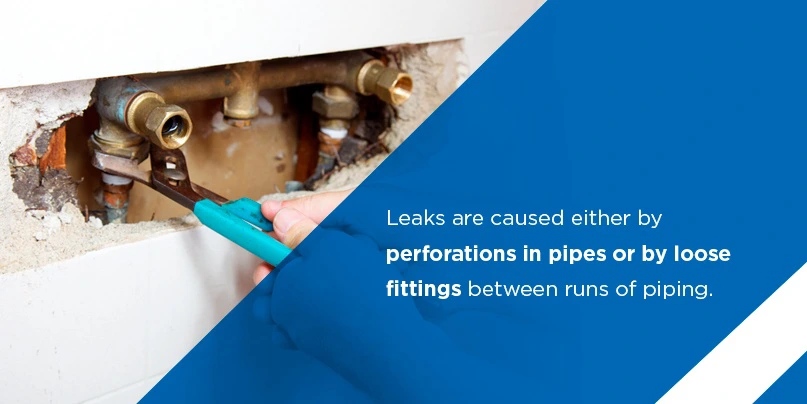
Drainage pipes are designed to keep sewer gases contained, so if you're smelling these gases in your bathroom, then you likely have a leak somewhere in your drain line. You should never ignore sewage smells in your home.
Leaks are caused either by perforations in pipes or by loose fittings between runs of piping. For certain types of metal pipes, leaks from perforations could develop over time due to corrosion. In the case of fittings that have come loose, a problem that could affect PVC pipes, poor installation could be to blame. This is a likely culprit if you are noticing sulfurous sewage smells in a newly built or renovated house.
Clogs are another contributor to leaks in your drain. A clog that includes a harsh cleaning product or other corrosive substances can allow these substances to sit and essentially eat through your pipe. Perforations from clogs will typically happen when the strength of your pipe's walls is already compromised from long-term corrosion.
How to Fix Leaking Pipes
The solution to fixing a leaking pipe is not as simple as the solutions we've discussed so far. The way to fix one depends on what material your pipes are made of, how you can access them, and a variety of other factors. In some cases, the discovery of a leak could be the first sign of more extensive issues. For instance, if you have old cast iron pipes in your home, they may need to be replaced entirely with new pipes.
Fixing a leaking drain line is a job you should leave to the professionals. When you smell sewer gases leaking from your pipes that you know the P-trap should contain, call a licensed plumber to come out and diagnose the problem. They should be able to fix the issue so you can breathe easily in your bathroom.
Contact Mr. Rooter of Greater Syracuse for New York Plumbing Services
When cleaning out your shower drain isn't enough to fix your smelly shower problem, contact Mr. Rooter Plumbing, your local shower plumbing expert in Syracuse, New York. Whether you are dealing with a stubborn clog, a leaky pipe, or any other plumbing issue, our licensed plumbers will expertly diagnose the issue and discuss the options for fixing it.
You can also call us for emergency plumbing help. The service professionals at Mr. Rooter Plumbing of Greater Syracuse are here to help you with all your plumbing needs, so all it takes is one phone call to deal with even the most serious plumbing issues. There is never a need to panic when you can pick up the phone and trust Mr. Rooter Plumbing to swiftly take care of the problem. Not local to the Greater Syracuse area? Find a Mr. Rooter Plumbing expert near you.
Emergencies are not the only time to reach out to a plumber. We’re always available to conduct a checkup of your plumbing system. This checkup involves no cost and no obligation. We are here to help you make sure your plumbing system is in tip-top shape so you can avoid costly issues and enjoy refreshing showers without worrying about unpleasant odors.

